
- Home
- Brand
- Main Stone
- Metal
- Alloy (10)
- Brass (45)
- Bronze (7)
- Gold (45)
- Gold Filled (30)
- Gold Plated (33)
- Gold Tone (18)
- No Metal (41)
- Rose Gold (23)
- Silver (122)
- Silver Plated (14)
- Silver Tone (14)
- Stainless Steel (8)
- Sterling Silver (456)
- Tibetan Silver (11)
- Unknown (85)
- White Gold (19)
- Yellow Gold (436)
- Yellow Gold Filled (12)
- Yellow Gold Plated (18)
- ... (1743)
- Metal Purity
- Type
- Ball / Bead (2)
- Bead (2)
- Bead Necklace (2)
- Beaded (13)
- Beads (230)
- Bracelet (14)
- Brooch (2)
- Chain (2)
- Coral (2)
- Naturelle (4)
- Necklace (1272)
- Necklace & Pendant (7)
- Necklace / Choker (81)
- Necklace / Pendant (13)
- Necklaces (14)
- Necklaces & Pendants (46)
- Pendant (7)
- Sets (4)
- Sterling Bench Beads (3)
- Strand Beads (2)
- ... (1468)
- Vintage
Antique Vintage Sterling Coin Silver Native Navajo Branch Coral Beaded Necklace
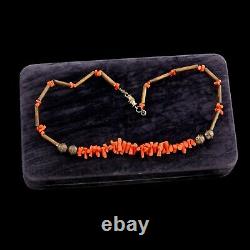
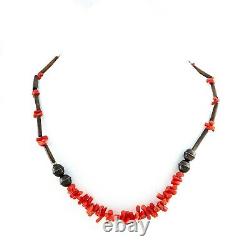
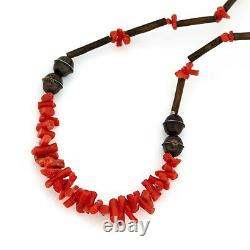
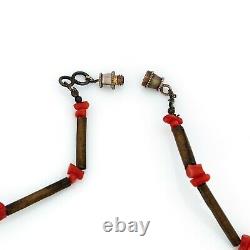
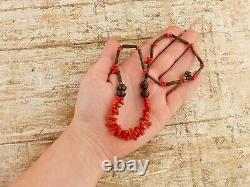


We have similar Native and Navajo items, which would pair nicely with this piece, for sale this week. Listing Description by: Dylan L. Age Circa: Antique Native Navajo C. Markings: Unmarked, Tested, and Guaranteed. Country of Origin: United States, Navajo Nation. Gram Weight: 15.3 Grams. Main Stone Measurements/Color: The size of the coral varies, On average the largest measure 11.8 mm long by 3.9 mm wide, On average the smallest measure 0.23" long by 0.12" wide, Opaque bright red hue. Stone Treatment: The stone(s) appear to be untreated, but we are not certified gemologists. Stone(s) have been tested and guaranteed using a professional Presidium Duo refractive, heat, and hardness tester. Stone Cuts: Smooth and Polished Branch Coral.
Item Measurements: The necklace has a wearable length of 17.25 and 11.8 mm wide. The tube beads measure 0.11" long by 0.64" wide. The round beads measure 0.35" long by 0.34" wide.
Link Type: Beads on Metal Wire. This gorgeous item is a red branch coral necklace with hollow repousse circular and tube beads. The beads were made using the repousse technique. The repousse technique dates back as far as the 3rd century BC and involves hand hammering silver into beautiful and intricate patterns.
The silver in this necklace is. 900 coin silver, which is commonly found in antique Native Navajo jewelry. This item was made during the Fred Harvey era, during the 1950s. Light tarnish on the sterling silver gives this piece an antique quality which we believe is quite lovely. The repousse beads are dented in some places, which is to be expected of an item this age, and does not affect the overall wear of the item.The price of this item has been reduced to reflect this. This listing is for the item only. This beautiful piece was made by a very talented Native American silversmith. It features handcrafted silversmith work throughout.
Antique Native American jewelry is very rare to find. This is due to these pieces being made for reservation and personal use before the tourist trade became popular. Very few pieces were made and even less survived to today. The Navajo Nation sits on 27,000 square miles within the states of Arizona, New Mexico, and Utah. The Navajo have a rich history and culture and have become known for creating some of the finest sterling silver and turquoise jewelry, incorporating their own traditional motifs with silversmithing.
The squash blossom necklace is perhaps one the most famous Navajo styles produced, along with turquoise inlay rings. Turquoise is an important stone in Navajo culture; symbolizing happiness, good fortune, and good health. The first Navajo silversmith, Atsidi Sani, was taught around 1865 by a Mexican silversmith.
Atsidi Sani, in turn, taught his four sons, who then started teaching other Navajo artisans. In the beginning, Navajo artisans created sterling silver jewelry for themselves and others in the Navajo Nation. The concept of Pawn, Old Pawn, and Dead Pawn Native American Jewelry came to be in the 1800s.
When a loan wasnt repaid, the item became known as either Old Pawn or Dead Pawn. Red Coral is a highly prized stone by Native American cultures and has long been used by artisans in the Southwest. Spanish traders introduced coral to the Navajo, Zuni, Hopi, and other tribes, and it quickly became a sign and symbol of wealth and status in many different Native American cultures. It varies in color from deep red to orange, with red being the preferred choice of Native American jewelry makers. Repoussé began as an ancient metalworking technique dating as far back as the 3rd century BC, involving malleable metal that was hammered onto the reverse side to create an image on the front.Examples are found all over the world; Greece, Egypt, and even the Hopewell periods in the American southeast. Reverse side hammering was also used to add detail to the front, creating intricate patterns using grooves, indentations, and channeling. The piece was then carefully polished to create a hollow, eye-catching treasure.
The item "Antique Vintage Sterling Coin Silver Native Navajo Branch Coral Beaded Necklace" is in sale since Sunday, May 12, 2019. This item is in the category "Jewelry & Watches\Ethnic, Regional & Tribal\Native American\Necklaces & Pendants". The seller is "abeautifultimeco" and is located in Fort Collins, Colorado.This item can be shipped worldwide.
- Ethnic Origin: Navajo
- Country of Origin: United States, Navajo Nation
- Modified Item: No
- Country/Region of Manufacture: United States
- Metal Purity: .900
- Main Stone: Coral
- Metal: Sterling Silver
- Jewelry Type: Necklaces
- Tribal Affiliation: Navajo
- Type: Beads

